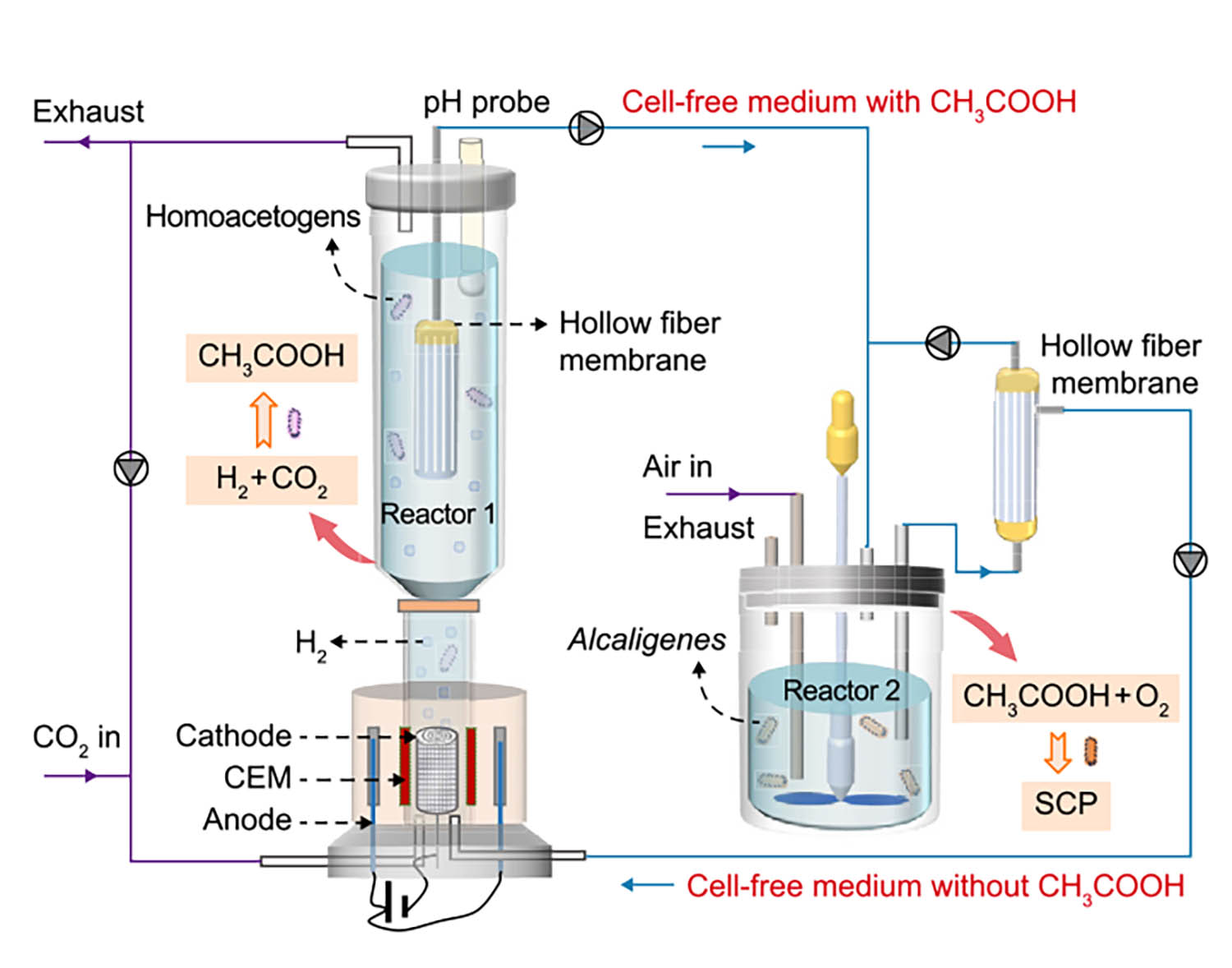

Scientists develop a bioprocess that converts CO₂ and electricity into protein-rich biomass
A team of researchers from Xi’an Jiaotong University and the Chinese Academy of Sciences has unveiled a bioprocess for producing single-cell protein (SCP) using carbon dioxide (CO₂) and electricity as primary inputs. Published in Environmental Science and Ecotechnology, the study presents an integrated anaerobic-aerobic bioreactor system that achieves high efficiency while minimizing environmental impacts.
Spearheaded by Zeyan Pan and Kun Guo, the study addresses key challenges in microbial electrosynthesis (MES)—a process where CO₂ is electrochemically converted into acetate by bacteria. While promising, MES has traditionally been limited by low-value products like acetate and methane. To overcome this, the researchers designed a two-stage system to upgrade acetate into SCP, a sustainable protein source that holds potential for animal feed and human consumption.
The first stage involves an anaerobic electro-bubble column reactor, where homo-acetogenic bacteria (Acetobacterium) convert CO₂ into acetate using electricity-generated hydrogen. This acetate-rich medium is then transferred to the second stage, an aerobic continuously stirred tank bioreactor. Here, acetate-utilizing bacteria (Alcaligenes) convert the acetate into protein-rich biomass. By recirculating the cell-free medium between the reactors, the system reduces wastewater generation, alleviates product inhibition, and enhances efficiency.
“This novel coupling of two reactors leverages complementary microbial processes while optimizing resource use,” said the researchers.
The integrated system demonstrated significant improvements over conventional methods. The maximum recorded biomass concentration reached 17.4g/L, with an average protein content of 74%, surpassing traditional protein sources like fishmeal (68%) and soybean meal (48%). Notably, the system achieved an average SCP production rate of 1.5g/L/day, providing a viable pathway for scaling up protein production.
The amino acid profile of the SCP biomass revealed high levels of arginine, beneficial for animal feed applications, though it showed deficiencies in sulfur-containing amino acids like methionine and cysteine. The researchers suggest future modifications to the medium to address these limitations.
The system’s design prioritizes sustainability. By recirculating the medium between the reactors, it minimizes water use and nutrient waste. Additionally, the innovative electro-bubble column reactor ensures efficient gas utilization, overcoming challenges associated with hydrogen solubility.
“This approach represents a significant step toward achieving a circular carbon economy by converting greenhouse gases into valuable bioproducts,” the authors noted.
However, the study acknowledges certain challenges. Long-term operation may risk contamination of the hollow fiber membranes used for medium recirculation. Additionally, the SCP’s high nucleic acid content could limit its direct inclusion in human diets without further processing.
While the current study focuses on SCP production, the researchers highlight the system’s adaptability for producing other high-value compounds, such as biofuels and specialty chemicals. They also see potential in improving the electron-to-protein conversion efficiency, which could further enhance scalability and economic viability.
The study concludes that this integrated bioprocess offers a pathway for sustainable, large-scale protein production while addressing pressing environmental concerns. By converting CO₂ emissions into nutritious biomass, it paves the way for innovative applications in food and feed production.
The research was authored by Zeyan Pan, Yuhan Guo, Weihe Rong, Sheng Wang, Kai Cui, Wenfang Cai, Zhihui Shi, Xiaona Hu, Guokun Wang, and Kun Guo, and supported by funding from Chinese research initiatives.
For the full study, see Environmental Science and Ecotechnology (DOI: 10.1016/j.ese.2025.100525).
If you have any questions or would like to get in touch with us, please email info@futureofproteinproduction.com

.png)






